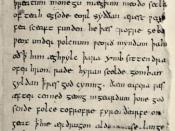When interpreting any type of literature, it is always important to attempt to divine the author's purpose in creating the work. The poems "The Wanderer" and "The Seafarer" are no exception to the rule. Far from being simple and easily interpreted, they are both packed with content, purpose and hidden meaning, but while they may contain the same types of goals, the content and meaning differ drastically in many areas, anywhere from actual feelings and methods, to lessons and teachings.
These poems are not meant to be read as merely stories, but are to be taken as lessons for the way which the people hearing them live their own lives. They are both methods of teaching and communication, set upon the same background, that of the sea, with many similar views, such as those of God, "It's good to find your grace in God, the heavenly rock where rests our every hope," (The Wanderer), "God is mightier than any man's mind.
Our thoughts should turn to where our home is," (The Seafarer), and of kings and kinship, "Where is the war-steed? Where is the warrior? Where is his war-lord?" (The Wanderer), "The days are gone when the kingdoms of earth flourished in glory; Now there are no rulers, no emperors, no givers of gold as there once were," (The Seafarer). However, while they both teach lessons, they are of different subject material. The Seafarer's theme is the struggle between home and the road, whereas the theme of the Wanderer is that of silent suffering.
Throughout the entire length of the Seafarer, there is a constant struggle between the author's desire to face the elements, to battle nature, to feel the spray of mist on his face, "My...


